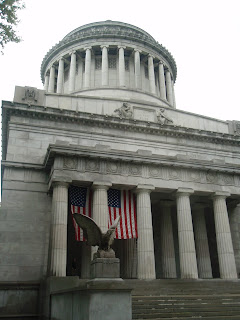 |
| The entrance to the memorial reads "Let Us Have Peace." Around 120,000 people visit the memorial each year. Photo by Bethany Kemming |
The old joke asks: “Who’s buried in Grant’s Tomb?”
The typical answer is Ulysses S. Grant. But National Park Service Language Interpreter Huascar Morell will say no one. That’s because Grant and his wife are not buried but entombed above ground.
Regardless of the answer, the Manhattan area memorial isn’t seeing many more visitors this year, despite recognition of 2011 as the 150th anniversary of the Civil War, according to Morell.
If the average New Yorker has heard of Grant’s tomb, she may be unclear on the details.
Just ask Elizabeth Suzio, where is Grant’s tomb? “Virginia?”
Located at 122nd St. and Riverside Drive in Manhattan, Grant’s Tomb has on average 120,000 visitors per year. Considering that over eight million people live in Manhattan, this number is a small percentage.
The many New Yorkers that don’t visit the tomb won’t gaze down into the dark center and see the shiny, adorned caskets of Grant and his wife. They won’t see the American Eagles crouching at the entrance, the mosaic murals, the orange yellow glass, and the long row of trees outside, all part of the renovations to the memorial made during the Depression. They won’t rest on the colorful mosaic benches outside, made by artist Pedro Silva who wanted to commemorate Grant in 1972.
Melody Cole may not have heard of the tomb, but she’ll tell you that doesn’t mean she doesn’t think they’re important.
“They’re very important to teach people about America that don’t know,” Cole said.
While many New Yorkers believe memorials and monuments are important, many of them simply go unnoticed. The same city that fought in 1994 to keep the Grants here and not in Illinois, now houses many residents that know little about Grant, the memorial, and the Civil War.
“I don’t know what it [the memorial] is…but I love America. America is the best,” New Yorker Freddie Dn said.


No comments:
Post a Comment